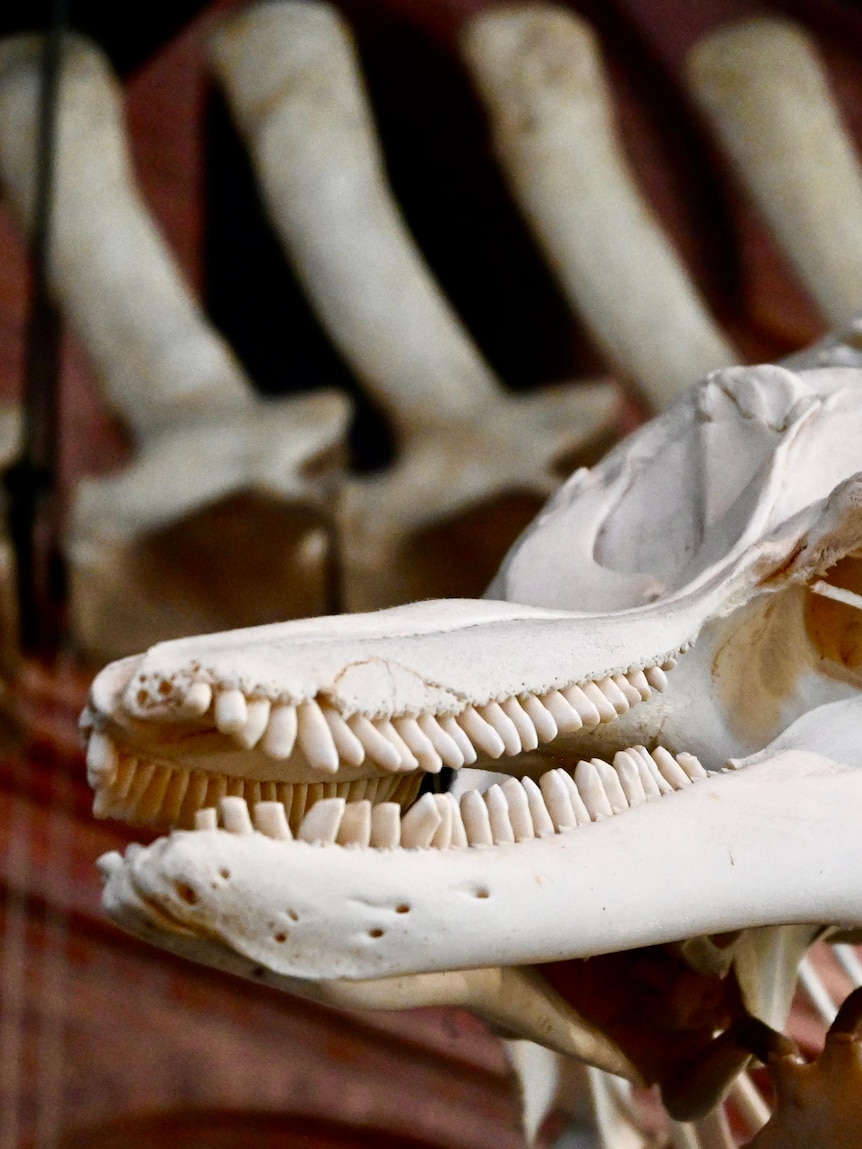Migrating whales are starting to arrive in Australian waters and a marine biologist says a research team dedicated to studying the creatures is on the brink of collapse.
Catherine Kemper, a former senior researcher at the South Australian Museum, says its whale sighting and strandings program has “fallen in a heap” in recent years.
The museum, which Dr Kemper says has one of the best collections of marine mammal specimens in the southern hemisphere, is struggling to maintain the program because of funding cuts.
Dr Kemper retired from the museum 15 months ago and said the marine mammal team now consisted of two unpaid staff.
“We used to go and collect [stranded whales] all the time and do the necropsies, if we could, and report back to the parks people or fisheries or local community people,” she said.
“That has already started to go on the decline over the last couple of years, so that will definitely die.
“[It will] be interesting to know what people do with the bodies from strandings.”
Humpback whales have started appearing along SA’s southern coastline and the Eyre Peninsula and there is concern for one that appears to be unwell.
Marine biologist Will Gilmore from the Encounter Bay Right Whale Study said the animal attracted a lot of attention after coming very close to the Victor Harbor causeway.
Mr Gilmore said the whale was covered in lice, lethargic, losing skin, and that there was a possibility it had an injury from a boat on its left side.
“It looked close to death’s door,” Mr Gilmore said.
‘This is the museum’s job’
Dr Kemper said in recent years researchers had been stopped from collecting specimens, doing necropsies, and collating data due to a lack of funding.
She said the museum was already being seen as having lost interest in stranded animals and she suspected stranded whales, dolphin,s and other potential specimens would now just be buried unless another institution took on the work.
“To me, this is the museum’s job,” Dr Kemper said.
“This is where people should go to find out the information and to be able to access those specimens for all kinds of work around the world, whether it’s genetic material or looking at the skulls to see whether we have a new species.”
In a statement a spokesperson for the SA Museum said the Department of Environment and Water had a responsibility to collect data on whale numbers and strandings in the state.
A spokesperson for the Department for Environment and Water said they were working through an arrangement with the museum to continue the independent collation and documenting of whale strandings in SA.
They said that arrangements future mammal necropsies were still being discussed and that a number of potential options were available, including universities other research organisations in SA or interstate.
‘Promising start’ to season
Rod Keogh, who has been taking tourists on whale watching tours at Fowlers Bay for the past 16 years, says the early signs indicate there will be plenty to see this year.
He said as well as the numerous early humpback sightings he had also heard of an unconfirmed sighting of up to six southern right whales around the Bunda Cliffs.
“It’s a promising start to the 2024 whale watching season,” Mr Keogh said after describing last year’s season as a “whitewash”.
“Fingers crossed the currents are doing the right thing, which they didn’t do last year,” he said.
“The Australian southern right whale population last year was at an all-time low.
“We didn’t have any resident southern right calves born here in Fowlers Bay.”
Mr Keogh said Dr Kemper’s work at the museum was invaluable.
He had sent off remains from southern right whales to her over the years and supplied data on numbers and whale behaviour.
Posted , updated




